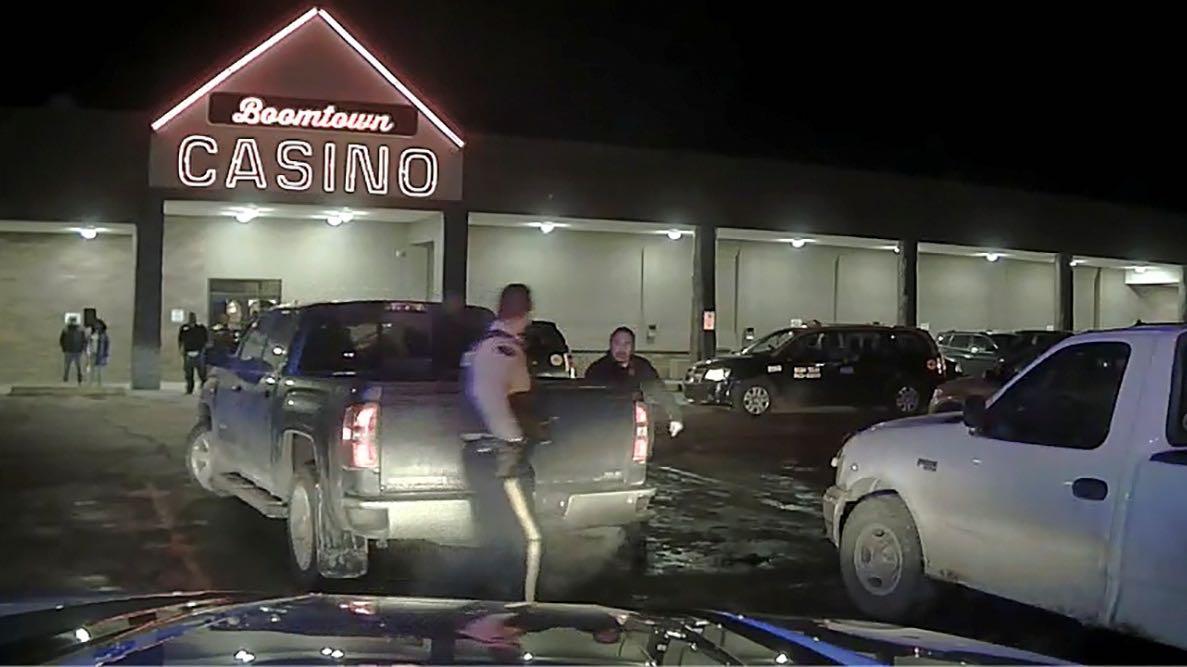Video of police beating Indigenous chief fuels ongoing anti-racism protests in Canada
In a dashcam video, officers from the Royal Canadian Mounted Police — or RCMP — stop the outspoken chief of the Athabasca Chipewyan First Nation in northern Alberta for an expired license plate.
From the start, Chief Allan Adam appears angry and frustrated.
“I’m tired of being harassed by the RCMP.”
“I’m tired of being harassed by the RCMP,” Adam says.
The situation suddenly escalates when an officer, who runs in from offscreen, launches himself at Adam, tackling him to the ground and punching him in the head.
“Don’t resist, sir!” the officer yells.
The incident happened in March, but the video was released last week, as protests sparked by the killing of George Floyd by a Minneapolis police officer spread across Canada. Amid the ensuing public outrage, Canadian Prime Minister Justin Trudeau said Canada had not done enough to address the treatment of Indigenous people.
“This is a problem that we have seen for many years. We have made steps to improve it. But there is a need for much more, much quicker,” Trudeau said on June 15. “And that’s why we are working right now with communities to address what needs to be done most rapidly, and we are going to move forward with them rapidly.”
Trudeau acknowledged that there is systemic racism in Canada. Other Canadian leaders, though, seemed reluctant to go that far. Ontario Premier Doug Ford on June 2 said Canada doesn’t have the same “systemic, deep roots” of racism as the United States. After criticism, he walked back those comments. The RCMP commissioner, Brenda Lucki, also at first said her organization wasn’t systemically racist before clarifying that systemic racism does exist at the RCMP.
Related: Black Lives Matter protests renew parallel debates in Brazil, Colombia
“It’s very disheartening because it’s all been talk. There hasn’t been much action,” said Lorraine Whitman, president of the Native Women’s Association of Canada.
She points out that it’s now been a year since the release of a 1,200-page, groundbreaking report into missing and murdered Indigenous women in Canada. The report concluded that thousands of Indigenous women and girls have been killed or have disappeared as a result of what they called “Canadian genocide.”
The report found that these deaths and disappearances weren’t properly investigated because of systemic bias within the police force. The Canadian government promised to have a national action plan in place by this month, but it’s been delayed.
“This has happened for years and years, and they need to take it seriously,” Whitman said. “We need to be heard, and we aren’t being heard. If there’s no action plan, they’re not doing anything.”
Related: Toronto’s first black police chief resigns
Meanwhile, troubling cases involving police and Indigenous people continue to make the news. Recently, a black and Indigenous woman died when she fell from a balcony while Toronto police were in her apartment. Another Indigenous woman was shot and killed by police in Edmundston conducting a well-being check. In New Brunswick, officers fatally shot an Indigenous man.
“It’s an uphill battle, especially when it doesn’t stop,” said Norm Leech, executive director of the Vancouver Aboriginal Community Policing Centre. “If we could go a week or two without a death, maybe we could get started. But it goes on and on.”
Leech’s group trains new officers in Vancouver about interacting with Indigenous people. They’re allowed three hours to explain that Indigenous people still see the RCMP in a historical context that isn’t fully acknowledged.
“When they created the RCMP, or originally the Northwest Mounted Police, well, their job was to police the frontier — which meant us,” Leech said.
Colonial powers made laws that Indigenous people never agreed to follow, he said, and Indigenous people are still seen as the “bad guys.” But Leech said this could be a turning point in the fight against police violence — not because of any acknowledgment or promises by the Canadian government. Instead, Leech says this time could mean real change because of the momentum behind the protests in both the black and Indigenous communities.
“I think it’s a natural alliance,” he said.
Related: From Minneapolis to Madrid, racial profiling and police harassment cost lives
Black and Indigenous communities have allied throughout history, even though colonial powers have tried to separate them, says Ciann Wilson, an assistant professor at Wilfrid Laurier University in Toronto. She leads the Proclaiming Our Roots project, which collects the histories and experiences of black and Indigenous Canadians.
“I think there is a really deep-seated investment in hiding that history of resistance and collaboration and solidarity. There’s an investment in defining black history as separate from or something other than Indigenous history versus something that’s been very intertwined with or overlapping with Indigenous history.”
“I think there is a really deep-seated investment in hiding that history of resistance and collaboration and solidarity,” she said. “There’s an investment in defining black history as separate from or something other than Indigenous history versus something that’s been very intertwined with or overlapping with Indigenous history.”
For his part, Chief Allan Adam also thinks this time will be different, and there will be change. At a press conference where he discussed his beating by RCMP officers, he sent a strong message: “Be aware that you are put on notice,” he said to law enforcement listening. “This can’t continue going on. And it has to stop.”
The story you just read is accessible and free to all because thousands of listeners and readers contribute to our nonprofit newsroom. We go deep to bring you the human-centered international reporting that you know you can trust. To do this work and to do it well, we rely on the support of our listeners. If you appreciated our coverage this year, if there was a story that made you pause or a song that moved you, would you consider making a gift to sustain our work through 2024 and beyond?
